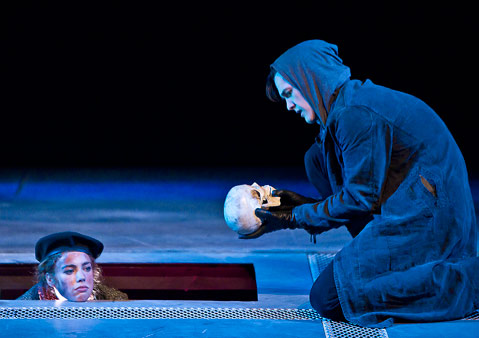UCSB Presents Hamlet
Hamlet at the Hatlen Theater through May 28

How do you solve a problem like Hamlet? The world’s most famous play has tantalized thespians for centuries with its siren call to a stage destiny of almost certain inadequacy. When something comes as close to perfection on the page as Hamlet does, what’s a production to do? Alter the play too much, and Shakespeare appears silently at your elbow, to observe and mock voguish theatrical conceits. But too timid an interpretation will likewise fall short, leaving the actors to fend for themselves in a howling tempest of rhetorical genius. Fortunately, this new production by director Irwin Appel and starring a marvelous cast of UCSB BFA students manages to balance the competing claims of invention and fidelity. What they arrive at is, if not a perfect Hamlet—whatever that might be—at least a perfectly enjoyable Hamlet, packed from curtain up to final bow with every delicious and glittering morsel of Shakespeare’s endless Elizabethan banquet. This Hamlet inhabits its theater fully, earning for the Hatlen the hyperbolic name of “Globe” because it seemingly contains everything.
From the opening sequence in which Brian Bock makes his appearance as the Ghost of King Hamlet, it’s clear that staging and blocking will have a huge impact not only on the way the show looks and feels but also on how it runs. By extending the center of the main stage into the audience with a thrust, and using both the side aisles and onstage scaffolding to expand the available playing space, Appel has given the cast room to explore the play’s vivid dynamics with a fresh approach. When Eduardo Baumann and Emily McKeown come on for the first time as Claudius and Gertrude, a judicious combination of this extended playing space and an impressive sound design puts the audience in the center of the action. As Hamlet, Merlin Huff travels what seems like miles, prowling the castle’s halls and pediments as his words and consciousness expand to fill the infinity of implied space that surrounds him. Huff’s nuanced yet powerful performance is one for the ages, a virtuosic display of technique in the service of deep understanding that puts the English-speaking stage’s most challenging role within easy emotional reach.
The big sightlines and glorious negative spaces of the show’s design contribute to an evening that never lags. For example, I’ve never seen the play within the play done this well. From the molten intensity of the Player King’s great monologue (Bock again) to the naughty banter and near-slapstick comedy between Hamlet and Ophelia (Christine Buccelli) and Polonius (Robert Torres), respectively, the sequence is bright and eventful. In fact, there are too many brilliant turns to do more than catalog them: Alexia Dox, wonderfully comic and flexible of voice as the First Gravedigger; the marvelous Courtney Salvage, who makes a female Horatio seem not only natural but almost necessary; and the fiery Laertes of Jak Watson. Don’t miss this chance to see what happens when “There’s a divinity that shapes our ends / Rough-hew them how we will.”



